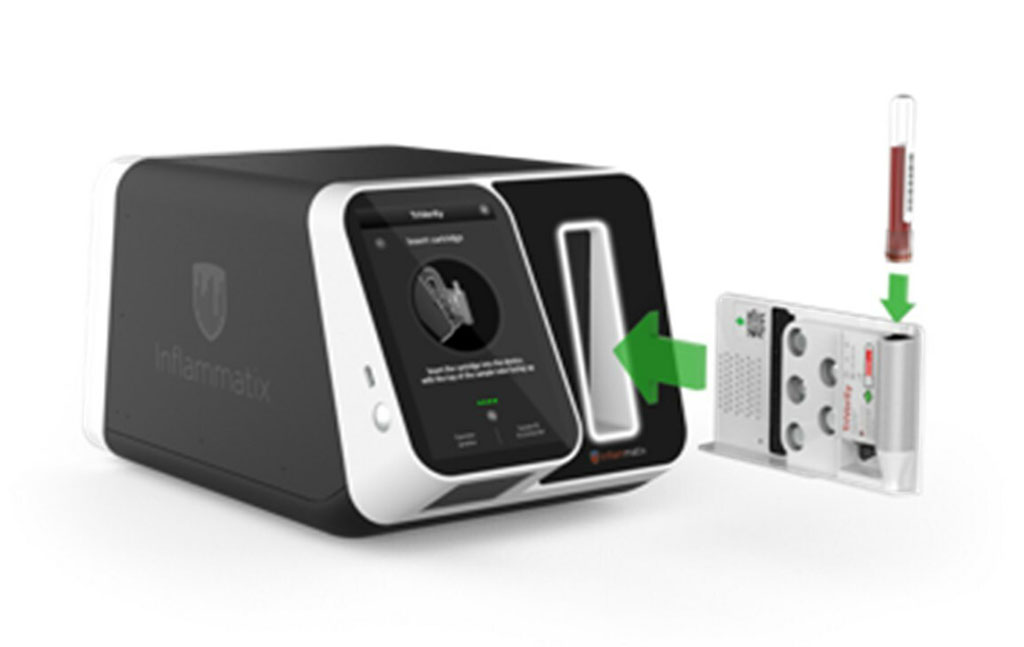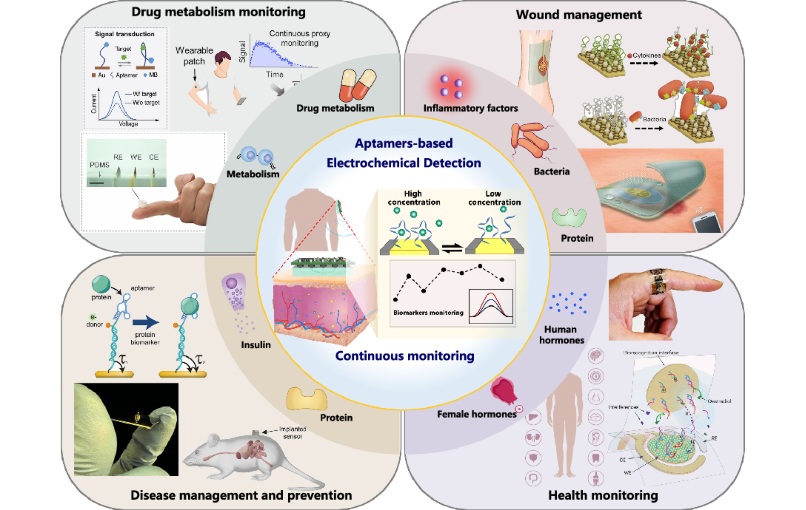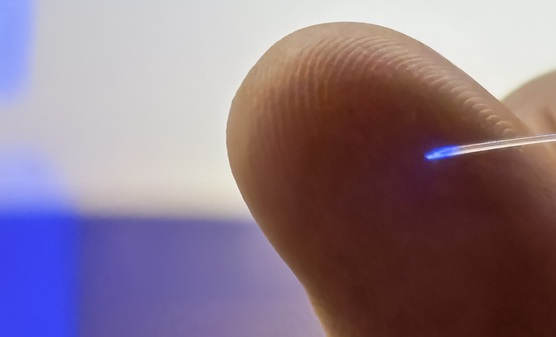World's Highest-Multiplex POC System with RNA Quantitating Ability Detects Bacterial Infection
|
By HospiMedica International staff writers Posted on 20 Nov 2023 |

Sepsis and antimicrobial resistance (AMR) are major contributors to increasing deaths and healthcare costs globally. In clinical settings, diagnosing and treating these conditions present significant challenges. Physicians, especially in emergency rooms, often face difficulties in making prompt, accurate decisions regarding antibiotic use for the roughly 15 million patients annually who present with suspected acute infection and sepsis. In response to this challenge, a new test system specifically designed for emergency department use is being developed. This system aims to evaluate the likelihood of bacterial or viral infections and the risk of acute decompensation, which necessitates ICU-level care, in patients with suspected acute infection and sepsis.
Inflammatix, Inc. (Sunnyvale, CA, USA) has completed technical development for its TriVerity Acute Infection and Sepsis Test System. This system includes the Myrna Instrument and the TriVerity Cartridge. The Myrna Instrument is adept at analyzing up to 64 messenger RNAs (mRNAs) from whole blood or other types of samples within approximately 30 minutes. Designed for potential use at the point-of-care, the Myrna Instrument is aimed to meet the criteria for Clinical Laboratory Improvement Amendments (CLIA) waiver. The accompanying disposable cartridges are designed to be stable at room temperature for up to a year.
The TriVerity Acute Infection and Sepsis Test, a leading product from Inflammatix, utilizes a panel of 29 mRNAs to interpret the body's immune response, assisting in the diagnosis of patients with suspected acute infection and sepsis. This test is particularly targeted at diagnosing patients who present with suspected infections in U.S. emergency departments. Inflammatix is actively working on completing its clinical studies, including the SEPSIS-SHIELD study, which is essential for the submission of the TriVerity Test system to the U.S. Food and Drug Administration (FDA). This multi-center study has already enrolled 955 patients out of the anticipated 1,500. Inflammatix anticipates the completion of the study and the subsequent FDA submission by spring 2024.
"Myrna will be the world's highest-multiplex point-of-care system capable of quantitating RNA, allowing us to bring 'precision medicine' into acute care settings," said Dr. Timothy Sweeney, CEO and co-founder of Inflammatix. "Completing technical development brings TriVerity a step closer to FDA submission and launch, and enables us to execute key clinical studies."
"With the completion of the test system, we look forward to further exploring partnerships that bring existing RNA signatures onto the Myrna ecosystem," Dr. Sweeney commented. "This may be an especially viable pathway given expected changes to the regulation of lab-developed tests and the increased reliance on a biomarker-driven approach to immunotherapy development."
Related Links:
Inflammatix, Inc.
Latest Critical Care News
- Aptamers Enable Real-Time Biomarker Tracking Without Blood Draws
- Specialized Dressing with Sensor Monitors pH Levels in Chronic Wounds
- AI Model Could Help Diagnose Spinal Cord Disease Up To 30 Months Earlier
- 3D-Printed Swallowable Robot Could Perform Gastrointestinal Procedures
- Next-Gen Hydrogel Could Transform Soft Tissue and Organ Repair
- Engineered Cancer Eating Bacteria Consume Tumors from Inside Out
- ‘Cyborg’ Transplants Could Replace Pancreatic Tissue Damaged by Diabetes
- Smartphone-Linked Catheter Sensor Spots UTIs Sooner Than Lab Cultures
- AI Tool Identifies Trauma Patients Requiring Blood Transfusions Before Reaching Hospital
- New Clinical Guidelines to Reduce Central Line-Associated Bloodstream Infection
- New Inhalable Treatment for TB Lowers Side Effects
- AI Algorithm Improves Antibiotic Decision-Making in Urinary Tract Infection
- 3D-Printed System Enhances Vaccine Delivery Via Microneedle Array Patch
- Whole-Heart Mapping Technology Provides Comprehensive Real-Time View of Arrhythmias
- Wearable Device for Diabetics Could Replace Continuous Glucose Monitoring Systems
- AI Stethoscope Spots Heart Valve Disease Earlier Than GPs
Channels
Artificial Intelligence
view channelCritical Care
view channel
Aptamers Enable Real-Time Biomarker Tracking Without Blood Draws
Continuous monitoring of biomarkers is critical for early disease detection, treatment evaluation, and personalized health management. Yet most clinical tests still rely on invasive, single-point blood... Read more
Specialized Dressing with Sensor Monitors pH Levels in Chronic Wounds
Any wound has the potential to become chronic, but the risk is significantly higher in individuals with certain medical conditions. Once a wound becomes chronic, healing slows, complications increase,... Read moreSurgical Techniques
view channel
Brain Implant Records Neural Signals and Delivers Precise Medication
Neurological diseases such as epilepsy involve complex interactions across multiple layers of the brain, yet current implants can typically stimulate or record activity from only a single point.... Read moreAI-Based OCT Image Analysis Identifies High-Risk Plaques in Coronary Arteries
Lipid-rich plaques inside coronary arteries are strongly associated with heart attacks and other major cardiac events. While optical coherence tomography (OCT) provides detailed images of vessel structure... Read moreNeural Device Regrows Surrounding Skull After Brain Implantation
Placing electronic implants on the brain typically requires removing a portion of the skull, creating challenges for long-term access and safe closure. Current methods often involve temporarily replacing the skull or securing metal plates, which can lead to complications such as skin erosion and additional surgeries.... Read morePatient Care
view channel
Revolutionary Automatic IV-Line Flushing Device to Enhance Infusion Care
More than 80% of in-hospital patients receive intravenous (IV) therapy. Every dose of IV medicine delivered in a small volume (<250 mL) infusion bag should be followed by subsequent flushing to ensure... Read more
VR Training Tool Combats Contamination of Portable Medical Equipment
Healthcare-associated infections (HAIs) impact one in every 31 patients, cause nearly 100,000 deaths each year, and cost USD 28.4 billion in direct medical expenses. Notably, up to 75% of these infections... Read more
Portable Biosensor Platform to Reduce Hospital-Acquired Infections
Approximately 4 million patients in the European Union acquire healthcare-associated infections (HAIs) or nosocomial infections each year, with around 37,000 deaths directly resulting from these infections,... Read moreFirst-Of-Its-Kind Portable Germicidal Light Technology Disinfects High-Touch Clinical Surfaces in Seconds
Reducing healthcare-acquired infections (HAIs) remains a pressing issue within global healthcare systems. In the United States alone, 1.7 million patients contract HAIs annually, leading to approximately... Read moreHealth IT
view channel
EMR-Based Tool Predicts Graft Failure After Kidney Transplant
Kidney transplantation offers patients with end-stage kidney disease longer survival and better quality of life than dialysis, yet graft failure remains a major challenge. Although a successful transplant... Read more
Printable Molecule-Selective Nanoparticles Enable Mass Production of Wearable Biosensors
The future of medicine is likely to focus on the personalization of healthcare—understanding exactly what an individual requires and delivering the appropriate combination of nutrients, metabolites, and... Read moreBusiness
view channel
Medtronic to Acquire Coronary Artery Medtech Company CathWorks
Medtronic plc (Galway, Ireland) has announced that it will exercise its option to acquire CathWorks (Kfar Saba, Israel), a privately held medical device company, which aims to transform how coronary artery... Read more
Medtronic and Mindray Expand Strategic Partnership to Ambulatory Surgery Centers in the U.S.
Mindray North America and Medtronic have expanded their strategic partnership to bring integrated patient monitoring solutions to ambulatory surgery centers across the United States. The collaboration... Read more
FDA Clearance Expands Robotic Options for Minimally Invasive Heart Surgery
Cardiovascular disease remains the world’s leading cause of death, with nearly 18 million fatalities each year, and more than two million patients undergo open-heart surgery annually, most involving sternotomy.... Read more

















